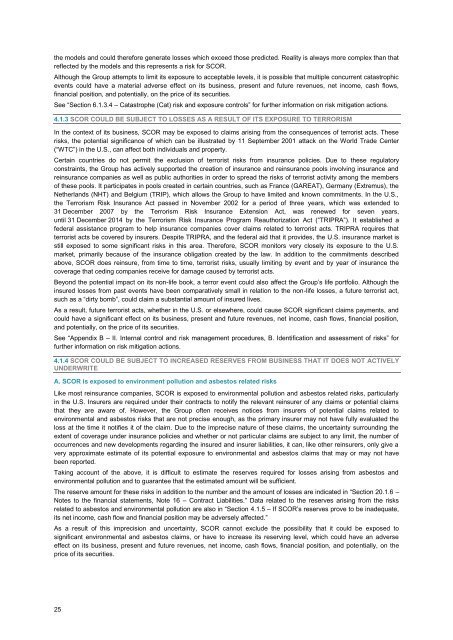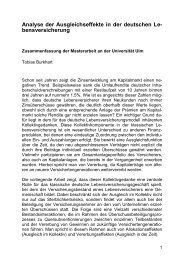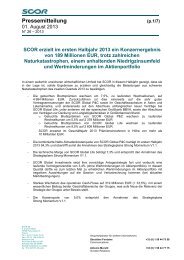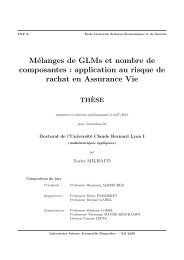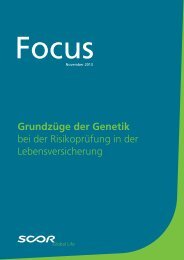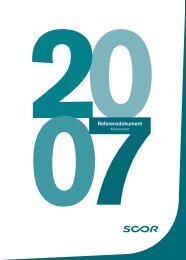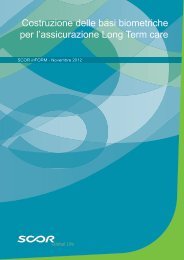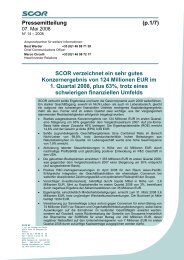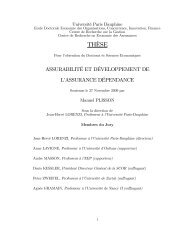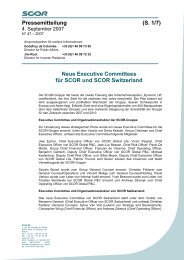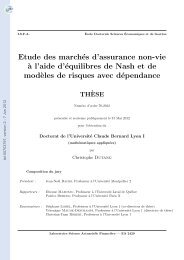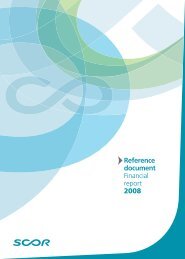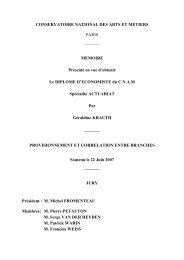4.4 Legal risk - Scor
4.4 Legal risk - Scor
4.4 Legal risk - Scor
Create successful ePaper yourself
Turn your PDF publications into a flip-book with our unique Google optimized e-Paper software.
the models and could therefore generate losses which exceed those predicted. Reality is always more complex than that<br />
reflected by the models and this represents a <strong>risk</strong> for SCOR.<br />
Although the Group attempts to limit its exposure to acceptable levels, it is possible that multiple concurrent catastrophic<br />
events could have a material adverse effect on its business, present and future revenues, net income, cash flows,<br />
financial position, and potentially, on the price of its securities.<br />
See “Section 6.1.3.4 – Catastrophe (Cat) <strong>risk</strong> and exposure controls” for further information on <strong>risk</strong> mitigation actions.<br />
4.1.3 SCOR COULD BE SUBJECT TO LOSSES AS A RESULT OF ITS EXPOSURE TO TERRORISM<br />
In the context of its business, SCOR may be exposed to claims arising from the consequences of terrorist acts. These<br />
<strong>risk</strong>s, the potential significance of which can be illustrated by 11 September 2001 attack on the World Trade Center<br />
(“WTC”) in the U.S., can affect both individuals and property.<br />
Certain countries do not permit the exclusion of terrorist <strong>risk</strong>s from insurance policies. Due to these regulatory<br />
constraints, the Group has actively supported the creation of insurance and reinsurance pools involving insurance and<br />
reinsurance companies as well as public authorities in order to spread the <strong>risk</strong>s of terrorist activity among the members<br />
of these pools. It participates in pools created in certain countries, such as France (GAREAT), Germany (Extremus), the<br />
Netherlands (NHT) and Belgium (TRIP), which allows the Group to have limited and known commitments. In the U.S.,<br />
the Terrorism Risk Insurance Act passed in November 2002 for a period of three years, which was extended to<br />
31 December 2007 by the Terrorism Risk Insurance Extension Act, was renewed for seven years,<br />
until 31 December 2014 by the Terrorism Risk Insurance Program Reauthorization Act (“TRIPRA”). It established a<br />
federal assistance program to help insurance companies cover claims related to terrorist acts. TRIPRA requires that<br />
terrorist acts be covered by insurers. Despite TRIPRA, and the federal aid that it provides, the U.S. insurance market is<br />
still exposed to some significant <strong>risk</strong>s in this area. Therefore, SCOR monitors very closely its exposure to the U.S.<br />
market, primarily because of the insurance obligation created by the law. In addition to the commitments described<br />
above, SCOR does reinsure, from time to time, terrorist <strong>risk</strong>s, usually limiting by event and by year of insurance the<br />
coverage that ceding companies receive for damage caused by terrorist acts.<br />
Beyond the potential impact on its non-life book, a terror event could also affect the Group’s life portfolio. Although the<br />
insured losses from past events have been comparatively small in relation to the non-life losses, a future terrorist act,<br />
such as a “dirty bomb”, could claim a substantial amount of insured lives.<br />
As a result, future terrorist acts, whether in the U.S. or elsewhere, could cause SCOR significant claims payments, and<br />
could have a significant effect on its business, present and future revenues, net income, cash flows, financial position,<br />
and potentially, on the price of its securities.<br />
See “Appendix B – II. Internal control and <strong>risk</strong> management procedures, B. Identification and assessment of <strong>risk</strong>s” for<br />
further information on <strong>risk</strong> mitigation actions.<br />
4.1.4 SCOR COULD BE SUBJECT TO INCREASED RESERVES FROM BUSINESS THAT IT DOES NOT ACTIVELY<br />
UNDERWRITE<br />
A. SCOR is exposed to environment pollution and asbestos related <strong>risk</strong>s<br />
Like most reinsurance companies, SCOR is exposed to environmental pollution and asbestos related <strong>risk</strong>s, particularly<br />
in the U.S. Insurers are required under their contracts to notify the relevant reinsurer of any claims or potential claims<br />
that they are aware of. However, the Group often receives notices from insurers of potential claims related to<br />
environmental and asbestos <strong>risk</strong>s that are not precise enough, as the primary insurer may not have fully evaluated the<br />
loss at the time it notifies it of the claim. Due to the imprecise nature of these claims, the uncertainty surrounding the<br />
extent of coverage under insurance policies and whether or not particular claims are subject to any limit, the number of<br />
occurrences and new developments regarding the insured and insurer liabilities, it can, like other reinsurers, only give a<br />
very approximate estimate of its potential exposure to environmental and asbestos claims that may or may not have<br />
been reported.<br />
Taking account of the above, it is difficult to estimate the reserves required for losses arising from asbestos and<br />
environmental pollution and to guarantee that the estimated amount will be sufficient.<br />
The reserve amount for these <strong>risk</strong>s in addition to the number and the amount of losses are indicated in “Section 20.1.6 –<br />
Notes to the financial statements, Note 16 – Contract Liabilities.” Data related to the reserves arising from the <strong>risk</strong>s<br />
related to asbestos and environmental pollution are also in “Section 4.1.5 – If SCOR’s reserves prove to be inadequate,<br />
its net income, cash flow and financial position may be adversely affected.”<br />
As a result of this imprecision and uncertainty, SCOR cannot exclude the possibility that it could be exposed to<br />
significant environmental and asbestos claims, or have to increase its reserving level, which could have an adverse<br />
effect on its business, present and future revenues, net income, cash flows, financial position, and potentially, on the<br />
price of its securities.<br />
25


